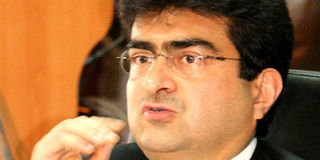Pattni cleared in Goldenberg scam

A High Court Judge has let Goldenberg architect Kamlesh Pattni (pictured) off the hook and professed his readiness to face public backlash over his controversial ruling. Photo/FILE
What you need to know:
- Justice Mutava prohibited the chief magistrate’s court from continuing with the trial of Pattni over the scandal and restrained police from arresting or prosecuting him further in relation to the case.
- He ruled that since the Central Bank was the complainant and had reached a settlement with Pattni to surrender the Grand Regency Hotel and return all Treasury Bills, there was now no rationale in pursuing the case.
- The controversial businessman hatched and executed the Goldenberg scandal between 1991 and 1993 and siphoned up to Sh100 billion from public coffers.
All charges have been quashed against the man who masterminded one of Kenya’s biggest financial scandal through which the country lost up to Sh100 billion.
Businessman Kamlesh Pattni, who faced nine criminal charges related to the Goldenberg scandal walked scot-free after the High Court ruled the businessman would not get fair trial over the case for, among other reasons, delay in the prosecution of the Sh5.8 billion fraud case.
But Director of Public Prosecution (DPP) Keriako Tobiko immediately said he will appeal against the judgement.
“Mr Pattni’s fundamental rights and freedoms have been violated by the State in several respects,” said High Court Judge Joseph Mutava.
“The prosecution’s (government) conduct has failed to meet the thresholds of fair trial, which renders his further prosecution unconstitutional,” said the judge.
He noted the delay in commencing prosecution, the flawed report on the Goldenberg scandal, lost documents, and unavailability of witnesses could not result in a fair trial.
The judge was referring to the report done by the Commission of Inquiry headed by former Court of Appeal Judge Samuel Bosire, which found Pattni to be the mastermind and central beneficiary of scandal.
“There is also the reality of settlement agreements reached with the complainants, a negative report on prospects of further investigations yielding new evidence, unavailability of witnesses due to death, besides fading memories of the surviving ones cannot lead to a fair trial,” he said.
Justice Mutava prohibited the chief magistrate’s court from continuing with the trial of Pattni over the scandal and restrained police from arresting or prosecuting him further in relation to the case.
The judgment brings to an end one of the country’s longest criminal cases, which began in 1993 when Pattni was charged with conspiracy to defraud the Government of billions of shillings.
In his ruling, he said there was no longer a complainant after Pattni returned the property in question to the Central Bank of Kenya.
Judge Mutava said Article 50 of the Constitution envisages speedy conclusion of criminal cases.
He ruled that since the Central Bank was the complainant and had reached a settlement with Pattni to surrender the Grand Regency Hotel and return all Treasury Bills, there was now no rationale in pursuing the case.
“It is my view that Mr Pattni cannot be possibly afforded a fair trial since his presumption of innocence has been infringed on a number of occasions including negative Press reports,” he said.
The judge said Pattni had returned Sh2.4 billion in the plea bargain entered with the then Kenya Anti-Corruption Commission (Kacc), now the Ethics and Anti-Corruption Commission.
“All supporting documents show there were consent orders settling all claims; Kacc undertook not to prosecute Mr Pattni while CBK consented to settlement and indicated it no longer had an interest in pursuing any criminal or civil claim,” he said.
Pattni had sought orders that the Attorney General, Director of Public Prosecution be stopped from prosecuting the case.
Justice Mutava said Pattni’s application had merit “in view of the constitutional transgressions that have been identified and which go into the core of the right to a fair trial”.
Also discharged in the 20-year-old case is former Kenya Commercial Bank General Manager Elijah arap Bii.
Two other former senior civil servants charged alongside Pattni were former Director of Intelligence James Kanyottu, former Treasury PS Wilfred Koinange, and former deputy governor Eliphaz Riungu. All the three are deceased.
In his 81 page judgement Justice Mutava said “the protection of a person accused of any criminal conduct as afforded by the Constitution must be observed”.
“This court finds that Mr Pattni’s and Mr Bii’s fundamental rights and freedoms guaranteed in the constitution have been violated by the state in several respects and on this ground and only on this ground prohibitory orders against the state are issued,” directed judge Mutava.
“ This effectively brings to an end any current or future criminal proceedings against Mr Pattni and Mr Bii arising from Goldenberg affair or Bosire Report.”
The judge said his judgement was bound to elicit uproar in public opinion and sections of the media.
“I am therefore comfortable and well prepared for any such reaction.”
The controversial businessman hatched and executed the Goldenberg scandal between 1991 and 1993 and siphoned up to Sh100 billion from public coffers.
The scheme was a web of lies, deception and fraud through which Mr Pattni purported to export gold and diamond jewellery through his Goldenberg International. The government would then pay him a concession for earning the country much-needed foreign exchange.
It turned out that Mr Pattni was exporting hot air and would fake paperwork for payment in connivance with unscrupulous senior civil servants.
Former Economic Secretary at the Treasury Prof Terrence Ryan estimates that it will take three generations for the economy to recover from Mr Pattni’s rip-off.
Mr Bosire’s commission report said: “Pattni is therefore shown conclusively and largely on his own admissions and documents, to be a perjurer (one who gives false evidence on oath) a forger, a fraudster and a thief,” the commission chaired by Justice Samuel Bosire concluded.



